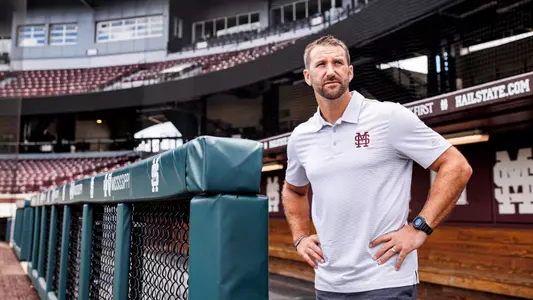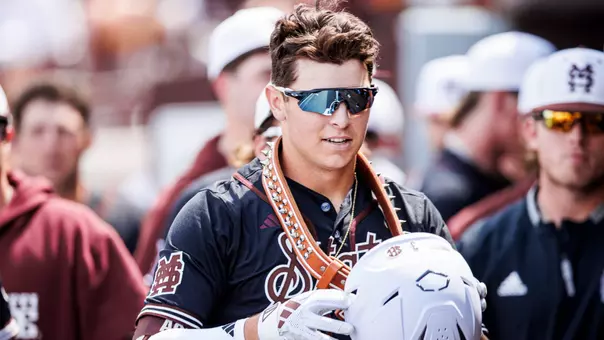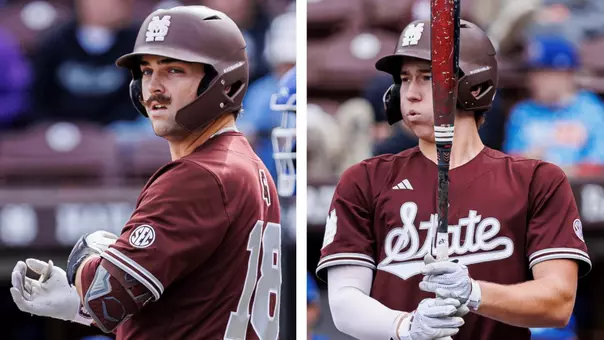
A Q&A With Pitching Coach Justin Parker
June 24, 2023 | Baseball, Joel Coleman
Hear from the new leader of the Bulldogs’ pitching staff.
STARKVILLE – Justin Parker is one of the top pitching coaches in all of college baseball and now, he's a Bulldog.
On the latest episode of the Dear Ol' State podcast, Parker sat down and discussed his coaching style, priorities, background and much more with MSU senior writer Joel Coleman. You can watch the full interview by CLICKING HERE, or listen on Apple Podcasts, Spotify, or online.
Here is a full transcript of the show, slightly edited for clarity:
Joel Coleman: Walk us through your last few days after becoming a Bulldog.
Justin Parker: I've been scrambling a little bit, playing catch up. I've got my wife and kid back in the Midwest, and [I'm] here. I've got everything I've got in the truck, just trying to get my bearings.
Coleman: Tell us a little bit about how this all came about and your relationship with Chris Lemonis.
Parker: We crossed paths [in the past]. I followed him at Indiana. Once they left, him and [Kyle Cheesebrough] both, I got in there. So, you get a sense of who he is first from coaching the same kids. They all spoke very highly of him. Such a great guy first and foremost. Great person. Great character. Easy to play for. Enjoyable to be around and obviously a very good baseball guy. Both of those guys come very highly regarded from people and players that have played for both of us. Then, we share a ton of mutual friends in the industry, and you can't really find anybody that says a bad word about him. That was very obvious to us in the process here when we came here last weekend – just how hospitable they were, how the community was involved, how family [was important]. Everyone says, 'Family, culture, atmosphere [is important].' You could feel that here. That was important to us. I'm sure he's vetted me very, very thoroughly. My wife and I also did some research here, and we feel like we're right where we're supposed to be.
Coleman: What are some of the things you prioritize as a pitching coach that's allowed you to become as successful as you've been.
Parker: Well, there's no magic pills. It's a lot about relationships. It's a lot about hard work. It's a lot about being in the trenches with the players, knowing they're going to be looking at you and they have to trust you. Of course, we have to trust them, too. But it's day in and day out. It's being in the trenches. It's a very blue-collar mentality. It's creating an identity. It's being able to put each of those guys individually in a situation to have success and sometimes that's different from the group as a whole, but just feel like relationships – it all starts and ends there. They have to believe in you. They have to believe in your message. Then I'm very hard working just as far as being in the trenches with them. Development and relationships are why I do this. Those things are important to me and that's truly what I come to work every morning to do is just invest in those kids.
Coleman: What do you feel like has allowed your staffs through the years to limit the walks, get a lot of swing and miss and do a lot of the things that lead to successful pitching staffs?
Parker: I think it starts with they have to feel like you have confidence and belief in them. So, you're putting them in positions that they're going to be able to have success. I think it starts with that confidence. A lot of it starts as well with movement patterns. Just being able to tap into their lower halves correctly [and] being able to move and sequence their body the right way so they're not so dependent on their arm and their head and their shoulders for both command and velocity. I think when you look at those three things, health, command and velocity go hand in hand, right? A lot of times when guys aren't moving correctly, they're going to have to compromise one or two to get the other. And this is a staff I see a ton of potential. Obviously, we were here [with South Carolina] this spring. The arm talent, the arm strength, the physicality was very obvious. Some of those things I think, just getting guys to move a little bit better is going to free them up to command the ball better, do it a little easier, get down the mound, being able to string together combinations and sequences with pitches that makes it harder on an opposing offense. Those are things that go into it. I wish I had that bottle. People will ask me about that, but it's not just two or three magic drills. It's just every day investing in each of them individually.
Coleman: What are some of the early impressions you have of your pitchers that you'll inherit here at MSU?
Parker: I'm excited. That's why I'm here. I believe in this group. I've done a lot of homework. I've watched a lot of tape over the last few days. I'm trying to hit the ground running once we get going in the fall. So, that's important to me to be able to figure out where they're coming from both collectively as a group and individually. I have a long notepad of notes already. That way I can relate to them and have a common starting ground. The talent is terrific. It is. There's arm strength everywhere. There's depth. There's a ton of left handers. It's a good balance. I think it's a hungry group. I think it's a group that last year – and I just experienced this a couple years ago at South Carolina, too – where a couple things don't go your way. This is an unforgiving league. And you get into a rut as a group where sometimes it's hard to dig yourself out. But this group, you can feel it. Last year hurt them. They're doing something about it this summer. A lot of them are here working. Every guy that I've talked to has that cohesiveness of the group [in mind]. They believe in each other. I think they're just hungry for a direction. Those are the things that excite me. They seem like great kids, willing and eager to work and I'm excited to get started with them.
Coleman: Is part of the task here just restoring belief in the pitching staff that they are incredibly talented guys that deserve to be here?
Parker: Sure. I looked at it both being here, seeing it in person. Knowing that the numbers weren't indicative of the talent in the person. And knowing that a lot of those guys are young. They're young and they're still growing and they're still developing. But that challenge excites me. I see the growth potential in this group and I believed in it leaving here after three games here. I thought, 'I can't wait to get out of here because it's a much better club than the numbers may say.' I'm excited for that reason. I think certainly it's one of those things where all of them feel like they have a clean slate and a fresh start. My goal here isn't to come in and start from scratch and tear everything [down]. My goal here is to figure out where they're at as a group collectively, where each of them are at as an individual, meet them along the way in their development, then take it from there.
Coleman: Both analytics and technology, as well as what your eyeballs tell you, are a big part of baseball in today's game. Where do you stand on some of that as you develop guys?
Parker: I think you've got to be very careful. I'm in the middle, and we will be moreso on the tech/analytics side in the fall than we will be in the spring. To me, first and foremost, you've got to be a competitor. You're not going to find that on an iPad or a computer or on a camera. So we're going to instill those types of principles with the guys with everything we do. We're going to compete. We're going to have that mentality as a group. This is a hard game for hard men and this is a hard league. So, we're going to have to work through those things as a group daily. But, I also think from a tech standpoint, with analytics, they allow us to grow faster. We don't have to have this three-month sample size to say, 'Hey, this and this aren't working.' We can tell pretty quickly what's going to work and what's not. And then I think you look at these kids, it's such an advantage nowadays. Everything is visual. So, they get objective, tangible feedback immediately. I think you can see things turn on in their brains. They learn that way. They learn faster that way. I'm going to teach a little more of an advanced curriculum with some of that stuff. To have the tools there to be able to show them I think helps that growth process happen a lot quicker.
Coleman: You're a former infielder back in your playing days and have helped out on the defensive side in past coaching stops. Will you be doing something similar here?
Parker: I haven't really gotten clarification on that yet with Coach Lem. That's what I'm used to doing. I'm used to putting together all of our defensive alignments – infield and outfield. I've always thought it helps me put together a scouting report and learn an opposing team's offense, each of the hitters individually. It also allows me to execute a game plan calling pitches knowing where guys are at and how to support that pitcher. I haven't really got that far yet, but I've done that certainly in the past and feel very comfortable doing that.
Coleman: You're a former infielder at Wright State. So how did you go from being an infielder to a pitching coach?
Parker: I was drafted out of high school as a pitcher. I went to college and played professionally as a shortstop and third baseman. My brother was a pitcher and was also a high pick. And you know how hard it is to break into this coaching world. I had got done playing. I was a volunteer for three years at Wright State University and after three years, it became obvious that something had to give. I needed to get paid and get a real job…We were out the door, took another job, then about a week later, my mentor – I look at him as a father figure – Rob Cooper went from Wright State to Penn State. So, that opened up an opportunity for me to work under Greg Lovelady. Greg asked me immediately, 'Would you want to stay on?' And then, 'What do you want to do?' Because as a volunteer, I just kind of filled the holes. I'd done a little bit of everything. And I just told him, 'Hire the best guy, let's have a great staff and I'll do whatever he doesn't.' So he hired a hitting coach, and I've been coaching pitchers.
Coleman: You mentioned your brother, former MLB pitcher Jarrod Parker. How much did you rely on his pitching insight as you started climbing the pitching coach ladder?
Parker: Well, initially, a ton. And look, the game, you see it uniquely through a different lens. I think that's part of my advantage is I see things through a different lens than most pitching coaches do. I've had to also be very patient teaching myself the movement patterns and mechanics and the deliveries. So, I'm a little bit more patient with guys I think than guys that have done it at a super-high level and it's like, 'Well, why can't you do X, Y and Z? It came easy to me.' So, it was just about learning, and I'm still learning. Every year I'm learning, trying to figure out how to get better. How to become a better communicator. How to streamline a development process clearer. Of course, you have to do things individually based on who you're dealing with. You have to coach each guy a little bit different. It's definitely been a lot of fun. I love the relationships with the kids. I love the development process. I probably enjoy the fall even more than the spring just because you really get to see growth. Those are the things that are important to me.
Coleman: Tell us a little bit about your family.
Parker: My wife, Angie, she's been outstanding. You know how this business goes and you have to have your better half onboard, and she's been incredible. And we've moved around quite a bit and she's just been an absolute rockstar. So, we just had our first son, Cameron. He's six months old now. He's in Ohio now with [Angie]. That's his eighth state in six months so he's well-traveled already. He's been to Starkville already. He loves it here already. He loves everywhere he's been. We're excited…Just excited to be a part of this community and [enjoyed] how wonderful everyone has been so far.
Coleman: You've of course been around to different stops. Just curious, what was your impression of this place before now getting the chance to put on the Maroon and White yourself?
Parker: Just going back to the spring [and coming in with South Carolina], obviously in the baseball world, you know the history. You know how much weight this place holds. You know how much people care. Just being in the SEC West, it's a different brand of baseball than anywhere else. Competitively, that really excited me. Then, to walk in here as an opponent and get treated so well by fans that care so much and you could feel just how hospitable this place was – and I'm not going to lie to you. The barbeque helps. You could smell the pits smoking from the hotel. Then you walk in. I actually thought this this year. I thought when I was walking in, 'How awesome would it be if your son was good enough to play in the SEC at a place like this and just be a parent and watch in this environment?' And the ballpark is second to none. Those are the things that stuck out to me immediately. The history, certainly. The success. Coach Lemonis and his staff and their incredibly high character. They care about the kids. They're invested in their lives both personally and as a player. Then just all of the incredible facilities and amenities here at the ballpark.
Coleman: Paint a picture of the next few weeks for you guys.
Parker: Just trying to hit the ground running and get on board with this staff. We're all doing the same things. I was doing the same thing two weeks ago as I am now. We're talking about the same names. We have maybe a little different need, just in some different spots and trying to get guys to fill those needs. But, yeah, it's busy. It's like a three-front war. You're fighting the draft. You're in the portal. You're also looking at the high school kids. You can't be in more than one place at a time. So, it's busy, but I've acclimated really well. I've been so impressed so far with just the nucleus of recruiting that's been on this staff – [Lemonis, Gautreu and Cheesebrough] all have just been running like a full three and hopefully [now] four-headed monster on things. It's just been awesome.
Coleman: In closing, any message you'd like to send directly to our passionate fanbase?
Parker: Very simply, I'm here to work. I love work. I'm very blue collar. I'm going to invest in these kids and I'm going to do my best to get the most out of them. Just ready to get started in the fall. I'm truly here and coaching and I've been very fortunate and blessed to be in this position, but it's all because of the relationships. It's all because of the development and investment in the kids. Nobody's going to work harder for them than I will.




